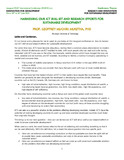Harnessing our ICT Skill Set and Research Efforts for Sustainable Development
Abstract
For some time now, ICTs have become ubiquitous, making them a common place phenomenon in modern society. Almost all electronics are ICT enabled to date, with most people who can read and write having interacted with ICTs one way or the other. For example, mobile phones which have changed the way we think, socialize and do business, are ICT-enabled. According to Statista, a German Company specializing in market and consumer data, The number of mobile subscriptions in Kenya rose from 0.13 million in the year 2000 to 61.41 million in 2020. This makes sense when you consider that many Kenyans walk with two or more mobile devices wherever they go.
Countries that have had the highest infusion of ICT in their sectors have reaped the most benefits. These benefits can generally be seen alongside the developed vs developing countries divide. ICTs are seen as a powerful solution to the problems affecting developing countries. Indeed, ICTs have the potential of making developing countries to catch up and even overtake developed countries much faster than originally thought.
This paper challenges us to harness ICT skill set through: 1. enhancement of our computing curricula by thinking through how they are designed and implemented. 2. Enhancement of research efforts by addressing four key problems that characterize research in this sector so as to come up with novel and sustainable solutions to challenges that affect our developing economies.
URI
https://journals.must.ac.ke/index.php/AJSTSS/article/view/110http://hdl.handle.net/123456789/6146

